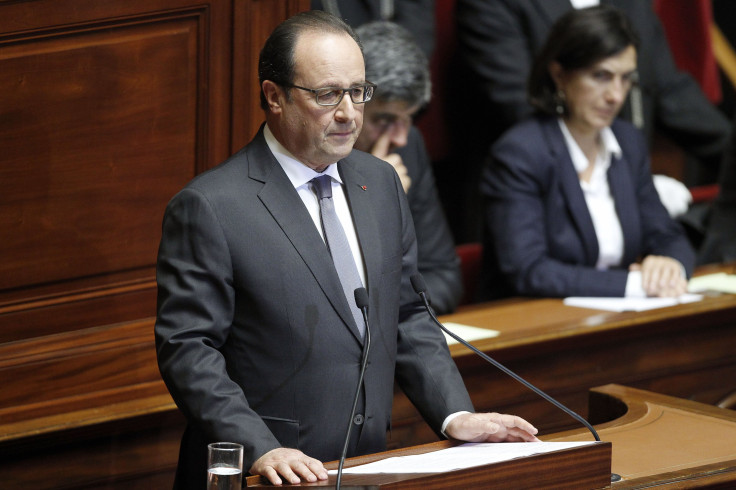Paris Terrorism Fuels 'Borderless Europe' Debate Over Free Movement, Migration

Friday's devastating terrorist attacks in Paris and the recent flood of Syrian refugees may have obscured the decades-old vision of a borderless Europe. French President François Hollande was reportedly preparing to call for an emergency suspension of the Schengen Agreement this week amid growing international concern about the grave consequences of unrestricted migration. The Schengen Agreement allows free movement through much of Europe, but that may now be more tightly controlled.
Hollande undoubtedly wants to shield his grieving country from further harm. Other conservative leaders want to curtail the European Union's open-border policies in order to protect their prosperous economies. But economists argue that such courses of action could hurt poorer nations that have relied on Europe's prized Schengen Agreement in the past, economists said.
Signed in 1985 and taking full effect 10 years later, the Schengen Agreement now includes 26 countries, 22 of which are in the EU. It enables free travel in places like Denmark, Greece, Germany, Italy and Spain -- people don't have to show passports to move between the nations, and there's no internal border control.
If that were to change, certain disadvantaged countries could suffer, said Christopher Hartwell, President of the Center for Social and Economic Research in Warsaw, Poland. He said shaky governments could be forced to pay high administrative costs to resurrect their border controls, which could devastate already cash-strapped nations like Greece. If they can't afford it off-hand, they could end up increasing taxes -- and possibly outraging their people.
"The EU's basically going to ask countries that don't have money in the coffers to spend more," Hartwell said. "For these countries that are already on fiscally unsustainable paths, it's a huge new border burden."
Many of the nations in southern Europe running on fiscal fumes are still struggling to recover from the Great Recession, during and after which hundreds of thousands of people emigrated in hopes of finding work. In 2013, Spain had the highest number of emigrants, with 532,000 people leaving the country, according to Eurostat. Even now, Spain's youth unemployment rate is nearly 50 percent. Italy's situation wasn't much better -- in 2013, 94,000 people chased jobs in more affluent nations like the United Kingdom, Germany and France, the Telegraph reported.
Natives living in more wealthy areas met this massive movement with backlash. In the U.K., British workers have accused EU migrants of stealing their jobs and abusing social benefits. The sentiment has snowballed, and the country is set to vote on a referendum on whether to leave the EU by the end of 2017. It is not part of the Schengen Agreement but does fall under the Single Market Act, which enables the free transfer of goods, services, labor and capital in the region.
Other nations are also debating the benefits of the EU's open borders. A poll conducted in July by the French Institute of Public Opinion showed that 67 percent of French nationals wanted to reinstate border controls, as did 56 percent of Italians and 53 percent of Germans. Outside the Schengen Area, about 63 percent of Britons said they wanted greater checks on migration, the Local reported.
The mounting opposition comes as Europe has been slammed in recent months with throngs of refugees desperately fleeing violence in Syria and Iraq. French far-right leader, Marie Le Pen, British Independent Party head, Nigel Farage and Dutch Freedom Party founder, Geert Wilders, are among the politicians making headlines and gaining followers as they demand the power to limit whom to let in and what rights to extend them.
Some experts said they doubted dismantling the Schengen Area would do anything but cause hassle. "The economic impact would be very muted," said Iain Begg, a Professorial Research Fellow at the London School of Economics and Political Science. "It would simply be adding half an hour to the cost of a truck crossing the border."
The move itself isn't unprecedented. Temporary border policies have been implemented before in the Schengen Area, said Nina Schick, an EU policy analyst and Communications Director at Open Europe, an independent think tank based in London. For example, this past September Germany reintroduced controls on its border with Austria when it was overwhelmed by refugees from Syria and Iraq. France did the same with its Italian border in 2011 when it couldn't accomodate migrants from Tunisia.
Schick said if either Hollande's alleged proposal or a wider-scope shutdown goes through, EU citizens could still travel from country to country, but they'd be checked thoroughly at the borders. Logistics may be more complicated and deliveries possibly delayed, she added, but the movement of products and employees wouldn't stop.
"It's one of the few things as of recent history the EU can really point to as something to be proud of," said Hartwell, the pundit in Poland. "Rolling it back now ... would erect so many barriers that took so long to take down."
© Copyright IBTimes 2024. All rights reserved.












